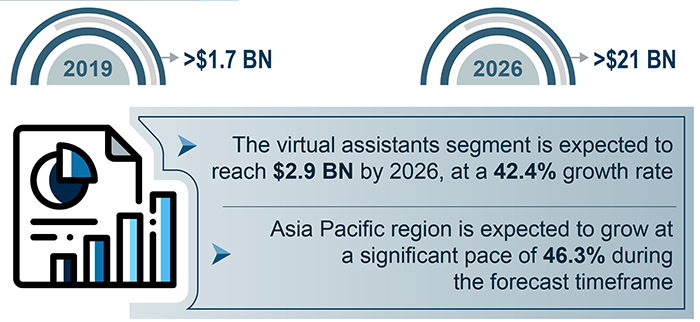The advent of artificial intelligence (AI) in healthcare brings the promise of transforming one of the most integral segments of the global economy. In 2018, the sector was estimated to be worth $8.45 trillion and worldwide healthcare spending is expected to hit $10 trillion by 2022.
Technology is rapidly becoming an important part of this growth. From cancer and other chronic diseases to risk assessment, when it comes to the use of technology to deliver more efficient, precise, and impactful patient care, the opportunities are nearly endless. As the healthcare industry grows and continues to thrive, significant evolution has been observed in patient demands from their medical providers and payment structure, alongside a marked rise in available data volume.
In this scenario, the healthcare artificial intelligence market is poised to become a revolutionary force, driving substantial advances across the care continuum. The use of AI in medical applications gives rise to myriad advantages over clinical decision-making tactics and analytics.
By interacting with relevant training data, learning algorithms can improve in terms of accuracy and precision, giving humans a deeper insight into care processes, diagnostics, variability of treatments, and patient outcomes.
A notable example of this was the use of AI by Beth Israel Deaconess Medical Center, the teaching hospital of Harvard University, for early-stage diagnosis of severe blood-related ailments. Doctors at the facility made use of AI-improved microscopes, in order to scan blood samples for harmful bacteria, such as staphylococcus or E. coli, at a faster pace than manual scanning.
Using 25,000 blood sample images to educate the machine on bacteria searching, the AI-based system achieved nearly 95% accuracy in detecting as well as predicting the presence of harmful bacteria in the patients’ blood.
In the current coronavirus pandemic situation, healthcare AI is emerging to be a notable line of defense. A recent report suggests that that the healthcare artificial intelligence industry could cross a valuation of $21 billion by 2026.
AI in Healthcare: A Key Contender in COVID-19 Defense
Since its declaration as a pandemic in March 2020, the COVID-19 crisis has rushed many healthcare companies and hospitals worldwide off their feet, in efforts to care for infected patients. When combined with existing research efforts, healthcare AI solutions are making it easier, faster and more economical to not just understand the way the virus spreads, but also how it can be managed.
AI companies worldwide have been contributing to this cause, developing novel tools that can be used as a defense against the novel coronavirus, in turn helping to mitigate the extent of the disruption it may cause.
French startup Clevy.io introduced a chatbot, designed to allow people to locate official government communications pertaining to COVID-19. The chatbot, powered by up-to-date information collected from the WHO as well as the French government, can assess symptoms and address questions related to government policies, the disease, immunity improvement, and exercise, with verified and accurate information provided in real-time. The solution has made it possible to monitor and detect the spread of the disease, in turn potentially preventing further outbreaks in localities.
In another instance, GE Healthcare recently launched a new AI algorithm designed to assess ETT (endotracheal tube) placements in patients of COVID-19. As a part of GE Healthcare’s Critical Care Suite 2.0, the healthcare AI solution will aid clinicians in assessing the placement of ETTs during the ventilation process for critically ill COVID-19 patients. According to the company, the ET tube tip-to-Carina distance calculation was accurate within 1 cm in almost 94% of cases.
Redefining Medical Technology With Artificial Intelligence
As big data becomes increasingly manageable and measurable, processing, analyzing and finding patterns in medical data is becoming easier with the use of AI. Undoubtedly, the integration of machine learning (ML) and AI into the fast developing health-tech segment has the potential to transform the traditional methods of managing, diagnosing and treating various health issues.
In medical technology, unlike other application areas, artificial intelligence is not restricted just to the sales and operations functions of the value chain. Rather, the rapid progress in AI technology has turned it into an ideal driving force for R&D, disease diagnostics and management, and clinical decision-making solutions, which could in turn create more potential for innovations in AI-based products.
For instance, researchers at New York-based NYU Langone Health developed an AI-based medical technology tool designed for automatic diagnosis of two of the most common lung cancer types, with an accuracy rate of nearly 97%.
The AI system demonstrated a strong learning potential, by teaching itself to identify genetic mutations that indicate lung cancer, via analysis of pathology lab images, a process that traditionally takes weeks and involves expensive genetic tests.
Given the significant business implications and end-to-end benefits of AI across distinct industries, the use of its capabilities in the medtech domain has been attracting the attention of major players in the sector. According to a recent survey, nearly 82% of leaders in the medtech industry have indicated AI to be integral to their business, putting them well ahead of their peers in the biotech and pharma sectors, and in the ranks of consumer and software industry executives.
This month the FDA approved the marketing of an AI-powered medical device, GI Genius, designed to advance the detection of colon cancer. Generating markers at the time of colonoscopy using machine learning capabilities, the novel system helps identify potential lesions. The device is the first of its kind and indicates a gradual enhancement of diagnostic medtech solutions through the integration of robust AI technology.

Medical Professionals Embrace AI for Expedited Drug Discovery
Over the past few years, AI has reinvented the drug discovery process and opened up new avenues for medical scientists to undertake faster development of medicines to tackle myriad diseases. According to our estimates, the drug discovery application accounted for nearly 27.3% of the healthcare artificial intelligence market share in 2019.
Discovery, development and approval of new drugs, while an indispensable part of the healthcare ecosystem, is generally a costly and long-drawn process. A major chunk of time is dedicated to preliminary clinical trials and research.
Through the conventional route, it can take nearly a decade for new medications to reach this stage, while it should be noted that clinical trials could span six to seven years and have less than a 12% approval rate. Based on a Journal of Health Economics report by Tufts Center for the Study of Drug Development, this process can cost pharma companies an average of $2.6 billion.
It has been projected that AI can help new drugs reach the clinical trial stage over five times faster, whilst cutting down industry costs by almost 30%.
For instance, DSP-1181, a joint venture between UK-based Exscientia and Japan-based Sumitomo Dainippon Pharma, and the first drug in the world to be created using AI technology, had entered Phase I clinical trials. DSP-1181 is a long-acting, potent serotonin 5-HT1A receptor agonist, which can be used to treat patients with OCD (Obsessive Compulsive Disorder), would ordinarily have taken up nearly five years of research time through conventional means of development. However, the use of AI allowed completing the exploratory phase in less than 12 months.
The COVID-19 pandemic has also provided an ideal testing environment for the use of healthcare AI solutions by pharma companies to bring new medications to market faster. For instance, BenevolentAI, a UK-based company has used machine learning and AI to help expedite the process of drug discovery.
The technologies were deployed by the company to scan its existing portfolio of approved drugs, in search of one that could be repurposed as a potential treatment for the coronavirus. By making use of AI in healthcare application, the company aimed to eliminate the necessity of developing a completely new drug, and ultimately speed up the process of finding an effective cure for the disease.
The potential of AI, especially in drug discovery, is a major area of interest for many medical entities in recent years. It undoubtedly has the ability to catapult medical researchers to the forefront of drug development via actionable insights derived from unstructured data stacks, in lesser time. High accuracy, improved visibility and efficiency are the key pillars strengthening the use of machine learning capabilities in healthcare applications.






